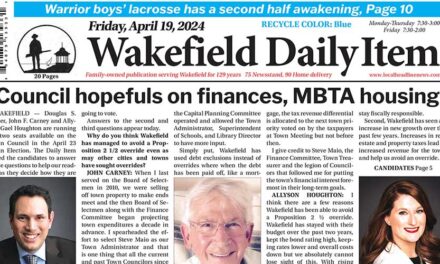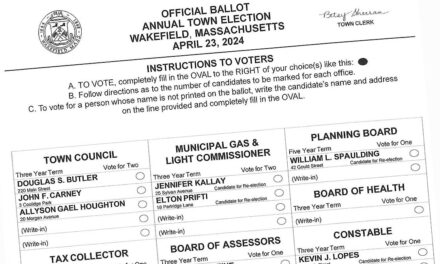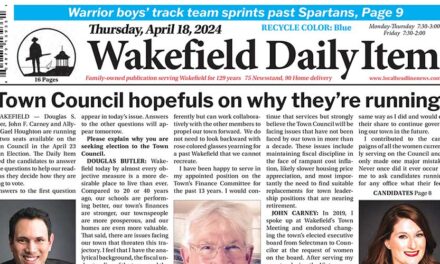Published in the October 31, 2017 edition.
By MARK SARDELLA
WAKEFIELD — The town is putting business owners, landlords and residents of multi-unit dwellings in the downtown on notice that their days of using the public trash barrels in the Square for their business or household trash are over.
Selectmen Chairman Paul DiNocco told the board at their meeting last night that he has been made aware of an ongoing issue where some residential and commercial tenants in the Square are utilizing these barrels for their personal or business trash.
Town Administrator Stephen P. Maio provided a memo reminding the board that the town, through its Board of Public Works, decided decades ago to only provide trash pick-up from 1 to 4 family residential properties.
Businesses are required to have their own trash receptacle and arrange for private pickup and disposal of refuse. Owners of residential buildings with more than four units are also not eligible for town trash pickup and are required to arrange for private trash pickup and
provide their tenants with facilities for proper trash disposal.
DiNocco asked Town Counsel Thomas Mullen to elaborate.
Mullen pointed to the following regulation in the state Health Code that is enforced by the local Board of Health:
“The owner of any dwelling that contains three or more dwelling units, the owner of any rooming house, and the occupant of any other dwelling place shall provide as many receptacles for the storage of garbage and rubbish as are sufficient to contain the accumulation before final collection or ultimate disposal, and shall locate them so as to be convenient to the tenant and so that no objectionable odors enter any dwelling.
“The occupants of each dwelling, dwelling unit, and rooming unit shall be responsible for the proper placement of his garbage in the receptacles required in 105 CMR 510.600(C) or at the point of collection by the owner.”
Mullen suggested encouraging the Board of Health to check with owners of downtown rooming houses and ask to see their trash facilities and how many barrels they provide.
Mullen noted that while the foregoing regulation does not apply to business owners or commercial landlords, there is a criminal statute that does apply.
“Whoever disposes of household or commercial garbage or refuse by placing it in a trash barrel placed on a public highway by the commonwealth, or by any political subdivision thereof, for the convenience of the traveling public shall be punished by a fine of not less than $200. One-half of any fine paid into a court shall be paid over to the city or town where the said offense occurred.”
Mullen encouraged the board to think about ways to assist the Police Department in chasing down business owners who are violating the statute. He suggested inviting downtown merchants to report any violations that they observe.
“If I were a downtown merchant and I was paying to have my trash carted away every week,” Mullen said, “I would deeply resent my competitors who were freeloading on the public system. They should be encouraged to call the police.”
Maio told the board that he has been working with the Health Department on this issue and along with them he would be contacting the owners of some of the larger multi-unit dwellings to make sure they are providing proper trash facilities for their tenants.
“My sense is that in some cases they are not,” he said.
But Maio stressed that it was not just the residential tenants illegally using the public trash barrels. He said that the town goes through the trash and has found that some downtown merchants are also using the public barrels for their business trash.
Selectman Brian Falvey asked what kinds of businesses were doing this. Maio said items with business names have been found as well as other telltale items.
“If we find a lot of hair in the trash, we know what kind of business it is,” Maio said. He added that some of the guilty parties are the first to complain about others.
Maio noted that the town picks up trash from the public receptacles in the downtown on Monday, Wednesday, Friday and Sunday of every week.
Falvey suggested that a little enforcement would likely go a long way toward curtailing the problem. He suggested that someone may do it once and when nothing happens it just becomes easier and easier for them to just throw household or commercial trash in the public barrels.
If you let the culprits know that you are on to them, Falvey suggested, the behavior often changes very quickly.
Falvey noted that for all of the town’s efforts to improve the downtown business district, it’s often the business owners and landlords themselves that mess things up. He suggested asking the Chamber of Commerce to step up and address this type of behavior by local businesses.
DiNocco asked board members if they wanted to instruct Maio to step up enforcement of the existing regulations.
Selectman Mehreen Butt pointed out that the regulations were already on the books. She suggested that the town consider increasing the pickup of trash in the downtown barrels to every day.
Maio said that when necessary the town does pick up on the in-between days.
Selectman Edward Dombroski said that it wouldn’t matter if the town picked up twice a day. Someone could still come along right afterwards and place a big black bag of personal trash on top of a public barrel.
Maio agreed to a suggestion from Selectman Brian Falvey to send a letter to every downtown merchant advising them of the statute and the town’s intention to enforce it.
Dombroski wanted the board to send a clear message that they consider this an important issue.
“This is a significant priority for the board as it relates to public health,” he said, “but also for the look and feel of our downtown and what we are trying to achieve there.”




